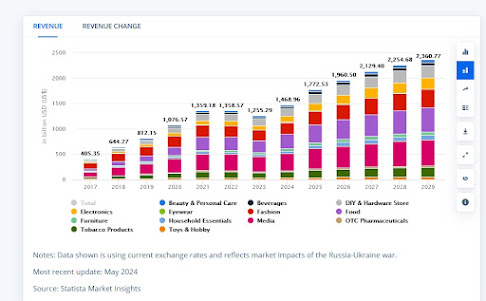As Mauritius continues to develop its digital infrastructure, e-commerce has become increasingly pivotal to its economic landscape.
Here are some of the top e-commerce trends shaping the market in Mauritius:
via
1. Mobile Commerce Growth
With the high penetration rate of smartphones in Mauritius, mobile commerce (m-commerce) is rapidly expanding. Consumers are increasingly turning to their mobile devices for shopping due to the convenience and flexibility it offers. E-commerce platforms are optimizing their websites for mobile devices and launching apps to enhance the shopping experience.
2. Social Media Integration
Social media platforms are becoming a significant driver of e-commerce in Mauritius. Many businesses are leveraging platforms like Facebook, Instagram, and WhatsApp to promote their products, interact with customers, and facilitate sales directly through social media. This trend is particularly popular among small and medium enterprises (SMEs) that utilize social media to reach a wider audience without significant investment in standalone e-commerce systems.
3. Increased Use of Digital Payments
Digital payment solutions are becoming more widespread in Mauritius, driven by the convenience and security they offer. Mobile payment solutions, internet banking, and digital wallets are seeing increased adoption rates. E-commerce businesses are integrating more payment options to accommodate consumer preferences and enhance the checkout process.
4. Local E-commerce Platforms Rising
While international platforms have a presence, there is a growing emergence of local e-commerce platforms catering to the specific needs of the Mauritian market. These platforms often offer products from local vendors and tailored services, such as same-day delivery within the island, which international platforms may not provide.
5. Personalization and AI
To improve customer engagement and boost sales, Mauritian e-commerce platforms are increasingly using AI technologies for personalization. This includes personalized product recommendations, targeted marketing campaigns, and chatbots for customer service. These technologies help in creating a more tailored shopping experience for users.
6. Sustainable and Ethical Practices
As global awareness of environmental issues grows, Mauritian consumers are becoming more interested in sustainable and ethical purchasing decisions. E-commerce platforms are responding by offering eco-friendly products, promoting local artisans and producers, and implementing green practices in packaging and logistics.
7. Expansion of Logistics and Fulfillment Services
To keep up with the growing demand from e-commerce, there is an expansion in logistics and fulfillment services within Mauritius. This includes the development of more advanced warehousing solutions, enhanced delivery services, and improved logistics technology to ensure timely and efficient delivery of products across the island.
8. Regulatory
The Mauritian government is actively working on improving e-commerce regulations to protect consumers and support the growth of online businesses. This includes measures to enhance cyber security, data protection laws, and consumer rights in the digital space.
These trends highlight the dynamic nature of the e-commerce sector in Mauritius, reflecting both global influences and local adaptations. As the digital landscape continues to evolve, these trends will likely expand, providing both opportunities and challenges for businesses in Mauritius.




%20(1).png)
